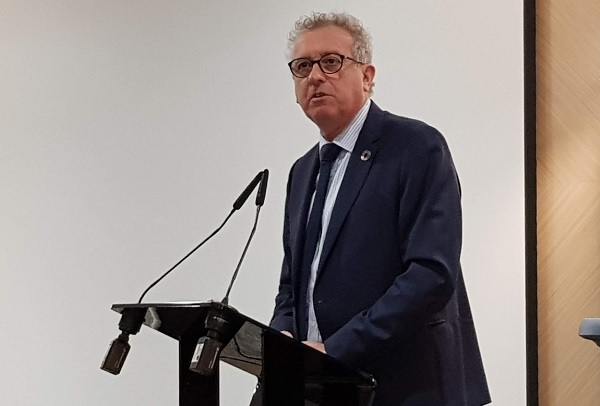 Finance Minister Pierre Gramegna at the 12th CIFG Meeting in Luxembourg;
Credit: Jazmin Campbell
Finance Minister Pierre Gramegna at the 12th CIFG Meeting in Luxembourg;
Credit: Jazmin Campbell
On Tuesday morning, Luxembourg's Minister of Finance, Pierre Gramegna, opened the 12th Counter ISIS Finance Group (CIFG) Meeting, being held today and tomorrow in Luxembourg.
The meeting is being held in the framework of the Global Coalition Against Daesh, which was created in 2014 and is composed of 81 members including Luxembourg.
In his opening remarks on Tuesday, Finance Minister Pierre Gramegna emphasised Luxembourg's commitment to this coalition since its inception and the fight against terrorism and terrorism financing in general. In this vein, Luxembourg participates in various working groups, including those looking at countering ISIS financing.
Minister Gramegna added that the European Union Member States were also working together to solve issues such as terrorism financing and money laundering. In this context, he mentioned the eventual possibility of an EU anti-money laundering agency to solve these issues with greater efficiency; the minister emphasised that Luxembourg is in favour of such a coalition at the EU level. He added that the EU had already approved five anti-money laundering directives and that "a sixth is in the making".
Returning to the purpose of the Global Coalition Against Daesch and the CGIS Meeting, Pierre Gramegna highlighted that the event had brought together representatives of the UN, the EU, the Financial Action Task Force (FATF) and the Gulf Cooperation Council (GCC) in their efforts to combat money laundering together. Minister Gramegna recalled the importance of such cooperation "for a small country like Luxembourg where talking about international cooperation is extremely natural", adding that it "is not an option [but] a must" for the Grand Duchy. Luxembourg's Finance Minister went on to highlight the role of security as "the dearest thing we have to defend our liberties and independence". He reiterated that the very existence of terrorism means that terrorism financing also continues to exist and whilst this fact may be widely recognised, the issue remains difficult to combat - hence the need for meetings such as those taking place in Luxembourg this week.
Returning to the role of Luxembourg in these matters, Pierre Gramegna recalled that the Grand Duchy relies on exporting its products and importing other countries' products. He recalled that Luxembourg is unique in that it is home to a significant foreign population (and attracts significant numbers of cross-border workers) and yet remains an example of "outstanding social peace and living together", where no extreme parties are in power. In this regard, Minister Gramegna described Luxembourg as "a kind of laboratory, a kind of prototype of a place where people from all walks of life live together and share [...] their values in peace".
Pierre Gramegna continued by highlighting the free movement of capital in the EU, as well as the role of Luxembourg's growing financial industry. Speaking of the creation of an EU single market in the 1980s, just two decades before the September 11 attacks, the minister stated that "back then no one had envisaged [the need for] such meetings" as the one being held today. He added that today it is both a national and international responsibility to counter terrorism financing and money laundering. He also emphasised that Luxembourg is "committed to this responsibility and to working with all of [the members] to eradicate terrorism". To achieve this, Minister Gramegna recalled the need to first "eradicate financing".
Pierre Gramegna concluded his opening speech as follows: "In an age where we step up our means, step up technology, step up human resources to combat terrorism and its financing, as well as money laundering, let's not forget that we are democracies and not to do that to the detriment of human rights and the rule of law". He added that this made it "even more difficult [to do], but to win the terrible battle, the terrible war against terrorism, we must stay true to [these values]".








